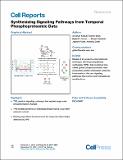Synthesizing Signaling Pathways from Temporal Phosphoproteomic Data
Author(s)
Köksal, Ali Sinan; Beck, Kirsten; Cronin, Dylan R.; Camp, Nathan D.; MacGilvray, Matthew E.; Bodík, Rastislav; Fisher, Jasmin; McKenna, Aaron; Srivastava, Saurabh; Wolf Yadlin, Alejandro Marcelo; Fraenkel, Ernest; Gitter, Anthony; ... Show more Show less
DownloadPIIS2211124718313895.pdf (2.544Mb)
PUBLISHER_CC
Publisher with Creative Commons License
Creative Commons Attribution
Terms of use
Metadata
Show full item recordAbstract
We present a method for automatically discovering signaling pathways from time-resolved phosphoproteomic data. The Temporal Pathway Synthesizer (TPS) algorithm uses constraint-solving techniques first developed in the context of formal verification to explore paths in an interaction network. It systematically eliminates all candidate structures for a signaling pathway where a protein is activated or inactivated before its upstream regulators. The algorithm can model more than one hundred thousand dynamic phosphosites and can discover pathway members that are not differentially phosphorylated. By analyzing temporal data, TPS defines signaling cascades without needing to experimentally perturb individual proteins. It recovers known pathways and proposes pathway connections when applied to the human epidermal growth factor and yeast osmotic stress responses. Independent kinase mutant studies validate predicted substrates in the TPS osmotic stress pathway. Köksal et al. present a computational technique, the temporal pathway synthesizer (TPS), that combines time series global phosphoproteomic data and protein-protein interaction networks to reconstruct the vast signaling pathways that control post-translational modifications.
Date issued
2018-09Department
Massachusetts Institute of Technology. Computer Science and Artificial Intelligence Laboratory; Massachusetts Institute of Technology. Department of Biological Engineering; Massachusetts Institute of Technology. Department of BiologyJournal
Cell Reports
Publisher
Elsevier
Citation
Köksal, Ali Sinan, Kirsten Beck, Dylan R. Cronin, Aaron McKenna, Nathan D. Camp, Saurabh Srivastava, Matthew E. MacGilvray, et al. “Synthesizing Signaling Pathways from Temporal Phosphoproteomic Data.” Cell Reports 24, no. 13 (September 2018): 3607–3618.
Version: Final published version
ISSN
22111247